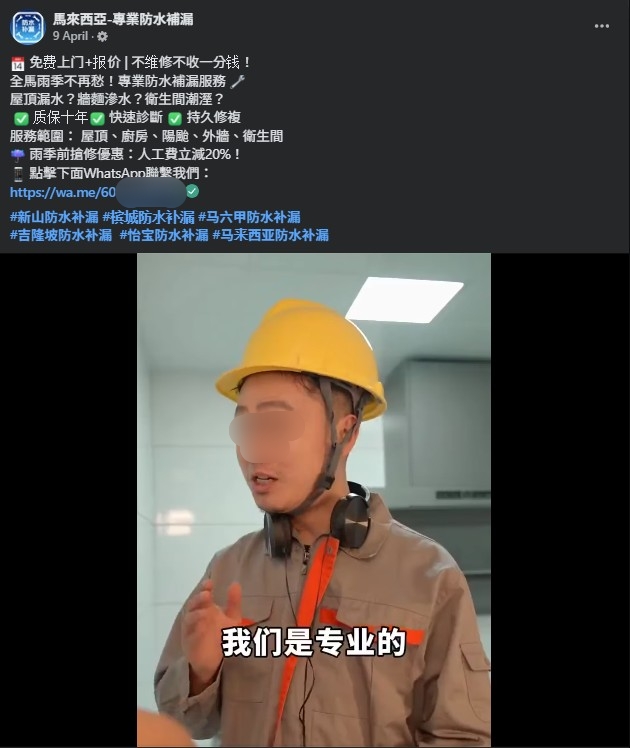A 47-year-old chef from Johor, currently working in Singapore, has revealed a new online scam involving fraudulent leak-repair services.
The victim, identified as Jia De Bao, encountered an online advertisement offering “no-wall-breaking” waterproofing solutions.
Enticed by its promise of non-invasive repairs, he paid RM6,900 (approximately S$2,080), but the problem persisted and the contractors vanished.
According to a report by China Press, Mr Jia responded to a Facebook advertisement that had attracted over 66,000 views and more than 2,000 likes.
The page, titled “Malaysia – Professional Waterproofing and Leak Repair,” promoted services with claims such as “Ten-year quality guarantee,” “Quick diagnosis,” “Durable repair,” and “Pre-monsoon promotional offer: 20% off labour fees.”
The company described itself in Mandarin as a “professional and legitimate waterproofing and leak-repair chain in Malaysia,” with “qualified technicians across states.”

The pitch also promised “free on-site inspection with no charge if no work is done,” “transparent pricing,” and operated under the principles of “honesty, quality assurance, satisfaction-before-payment, and customer-first.”

Facebook page history raises red flags over legitimacy
However, upon closer inspection, the operation lacked a verifiable website, physical address, or landline.
Contact was solely through WhatsApp. The Facebook page’s transparency settings showed it was originally created by a user named “Jonnie Wong” in 2022.
It was later renamed “Waterproof Helper” in February 2025 and subsequently rebranded to the current name in April 2025.

Crew spoke with Chinese accents, claimed tourist visa status
Mr Jia arranged for an inspection at his home in Taman Nusa Jaya Mas, Iskandar Puteri.
The next day, two tall men arrived in a Malaysian-registered vehicle, carrying two buckets of adhesive.
They quoted a price based on adhesive volume and promised longer guarantees than competitors.
They claimed to offer a six-year warranty and said they had several years of leak-repair experience in China.
Trusting their professionalism, Mr Jia allowed them to proceed with an adhesive injection method.
Following the brief work session, the men demanded full payment of RM6,900, to be transferred on the same day to a Singaporean bank account.
Work proved ineffective as leak persisted, crew vanished after payment
Despite their assurances, the repair failed to resolve the leak. Water stains remained visible, and the wall remained damp.
The crew claimed the adhesive residue would cure in a few days, but four days later, the issue persisted.
Repeated attempts to contact the men were initially met with excuses about travel.
Eventually, they stopped responding altogether.
Mr Jia attempted to reach them using a different phone number and surprisingly received a response, which deepened his suspicions.
He had previously requested a formal receipt but only received a handwritten note in Chinese, stating an amount in Chinese yuan and lacking any business registration details.
The document arrived two weeks later, allegedly from a Kuala Lumpur-based headquarters, further raising red flags.
Mr Jia said the men told him they were in Malaysia accepting job on tourist visas
However, further research led him to similar scam patterns in China, Taiwan, and Singapore. He believes the scheme has now reached Malaysian shores.
He filed reports with local police, the Domestic Trade and Cost of Living Ministry, and consumer arbitration bodies.
While police viewed the matter as a civil dispute and directed him to arbitration, his case was declined due to the lack of a verifiable business registration, which has instead raised suspicions of fraud.
Although resigned to his financial loss, Mr Jia is urging authorities to take stronger action against such fraudulent operators.
He highlighted the risks posed by individuals using tourist visas to provide unlicensed services, calling for tighter regulation of home-repair work and stricter checks on contractor credentials to prevent abuse of the visa-free entry scheme.
He encouraged the public to verify licences, business registration, and immigration status before hiring contractors, especially through social media platforms where such scams are increasingly common.
In May 2025, Malaysia and China agreed to extend their mutual visa‑free travel arrangement—allowing each country’s citizens to stay in the other for up to 90 days within any 180‑day period—by an additional five years, aiming to boost tourism and bilateral exchanges.
The post Malaysian loses RM6,900 to Chinese-accented pair who vanished after botched leak-proofing job appeared first on The Online Citizen.


